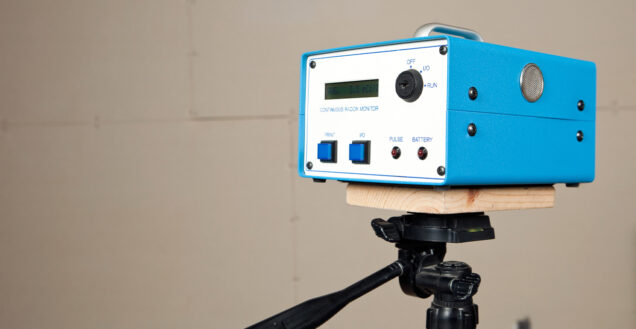Radon is a significant cause for concern in Connecticut. This colorless, odorless, and flavorless gas is produced by the breakdown of radioactive elements such as uranium in bedrock and soil, and our state happens to have quite a bit of it. Well owners need to be aware of the risk of radon, as it can enter a home not only from the air, but also through a water supply sourced from underground aquifers.
Here at Greco & Haines, we not only provide the essential service of testing well water for radon, but also offer a highly effective point-of-entry treatment system that removes this potentially hazardous gas before it infiltrates your household water.
Radon Basics: How It Can Enter Your Home
Radon is commonly found in Connecticut soils due to the region’s geology. It originates from the decay of elements like uranium and thorium, but it’s primarily produced by their byproduct, radium. Since radon doesn’t react with other elements, it gathers in the gaps within soil. This allows it to be released into the air or seep into groundwater, where it can accumulate.
Homes, especially their basements, are vulnerable to radon seeping in through foundation cracks. While this airborne entry is the primary way radon infiltrates homes, it can also come from well water. This water, sourced from aquifers, can carry dissolved radon. When you run the water, like when using a faucet or shower, some of this radon can be released into the indoor air.
How much radon is transferred from household water into indoor air depends on a number of factors; for example, higher rates of water flow (as in, say, showering) and higher water temperatures both result in more gas being released into the air. Research suggests that concentrations of 10,000 picocuries per liter (pCi/L) in household water may, through normal use, send perhaps 1 pCi/L of radon gas into indoor air.
The Health Risks of Radon
Whether it’s radon that has seeped into your home or escaped from running water inside, breathing in this radioactive gas in large amounts or over an extended period of time is not great, needless to say. Radon releases energy as it continues to decay, and these energy releases can damage your lung tissue and heighten your risk of lung cancer. Indeed, radon is the second leading cause of lung cancer in the U.S.
That’s the chief risk radon poses to human health – lung issues related to inhaled radon – but ingesting dissolved radon in your drinking water is another concern. This appears to increase your risk of stomach cancer and certain other health problems.
As many as 21,000 lung cancer deaths occur annually due to radon specifically in the water supply, according to the Centers for Disease Control and Prevention.
Radon Levels
The U.S. Environmental Protection Agency (EPA) suggests 4 pCi/L as the action level for indoor radon, further recommending that concentrations be lowered to 2 pCi/L if at all possible. The average level of indoor radon in Connecticut homes has been reckoned at about 1.3 pCi/L.
In terms of dissolved radon in private well water, the Connecticut Department of Public Health has suggested an action level of 5,000 pCi/L.
The Importance of Radon Testing in Home Well Water
Radon is sneaky, given it’s flavorless, odorless, and colorless. Fortunately, though, it’s easily detected through testing.
Any private well owner should have their water supply tested for radon: not just once, but periodically, as concentrations can change over time. Here at Greco & Haines, radon testing is among the numerous water-quality tests we can perform on your well water to ascertain whether it’s hosting potentially hazardous concentrations.
Those who don’t test for radon are potentially putting themselves at risk for cancer and other very serious health issues through both inhaling and ingesting the gas.
Radon Mitigation for Well Water
Let’s say you’ve arranged for a radon test of your well water supply, and it suggests a dangerous level of the gas. What can you do?
Well, plenty! Aeration is the EPA’s recommended treatment for radon. At Greco & Haines, we stock the highly effective B.C. Prescott bubbler system for aeration and radon-mitigation purposes. This is a point-of-entry treatment, aerating your well water so that radon bubbles out of it and is vented outside before the water comes into your household plumbing.
Considered 99% effective, bubbler systems are very compact, quiet, and come equipped with user-friendly features such as automatic maintenance reminders and a malfunction alarm. Not only that, but this aeration treatment – available in two different sizes for efficient matching to your household demand – also removes other volatile organic compounds from your water supply, and it can even boost your water pressure!
Contact Greco & Haines for Well Water Radon Testing & Mitigation
From checkups and tests to installations and emergency repairs, our services are available seven days a week and 365 days a year. Get in touch with the Greco & Haines team at 203-735-9308, 203-777-2256, or (toll-free from any CT area code) 1-800-922-2958, or use our online contact form.

